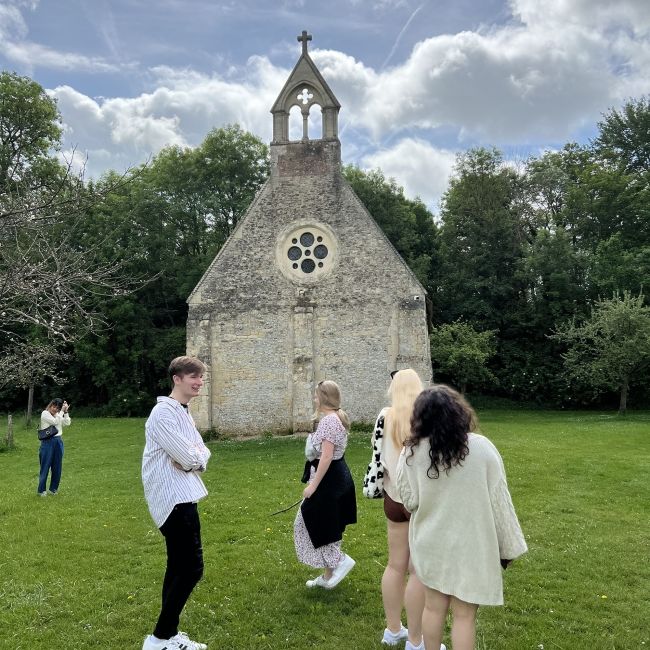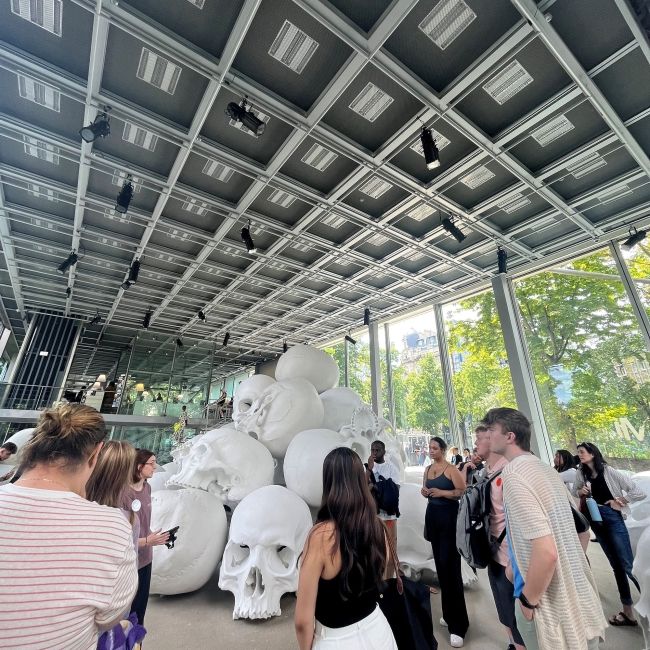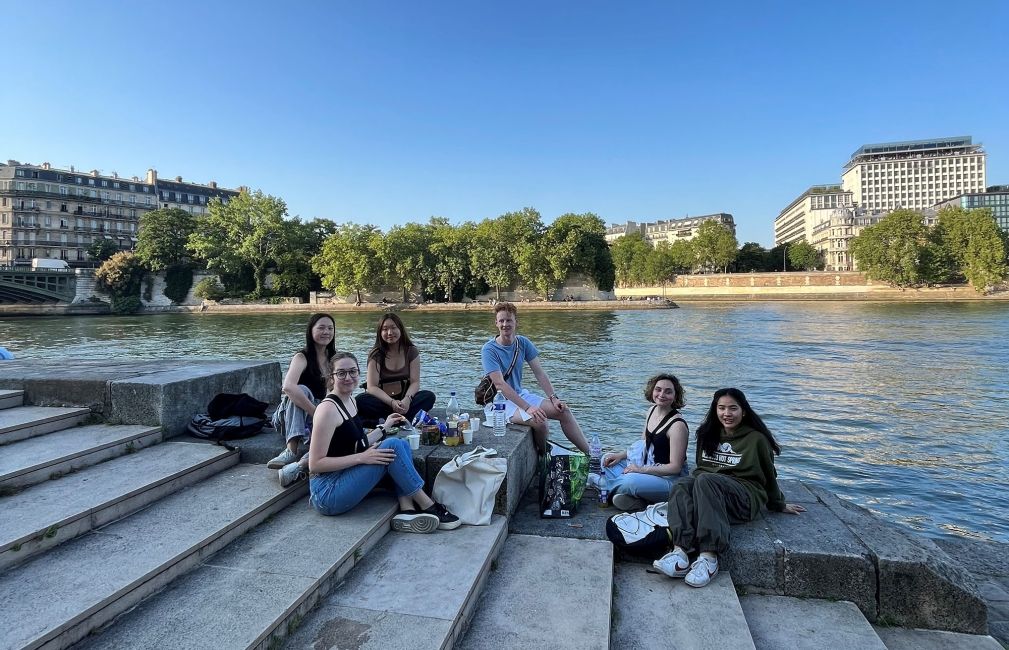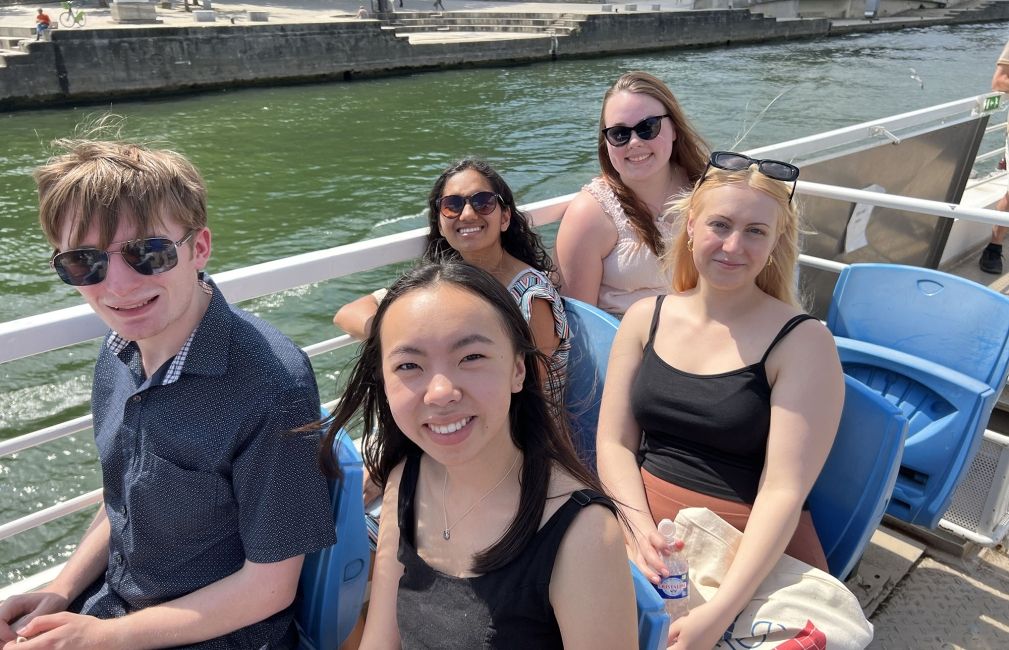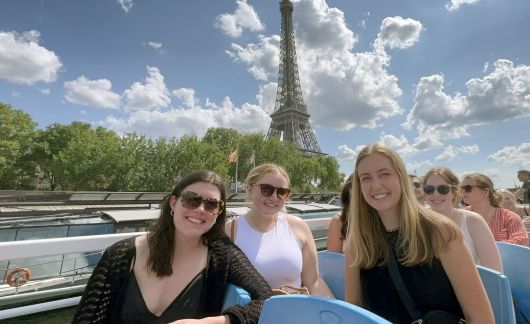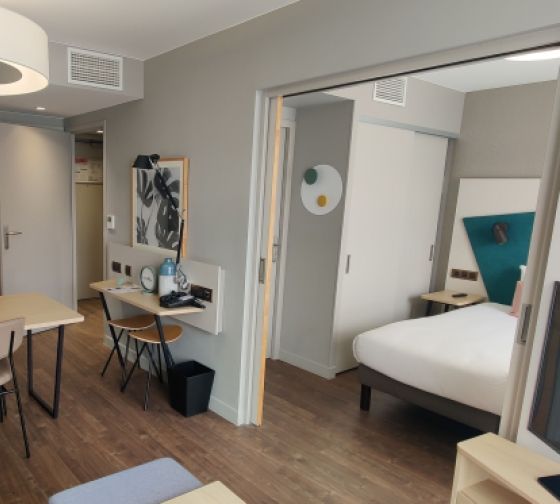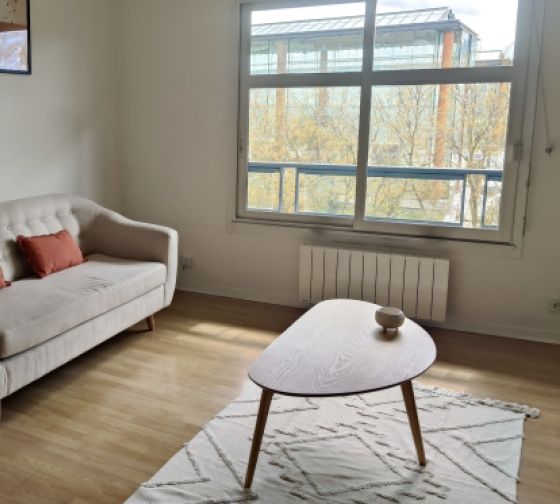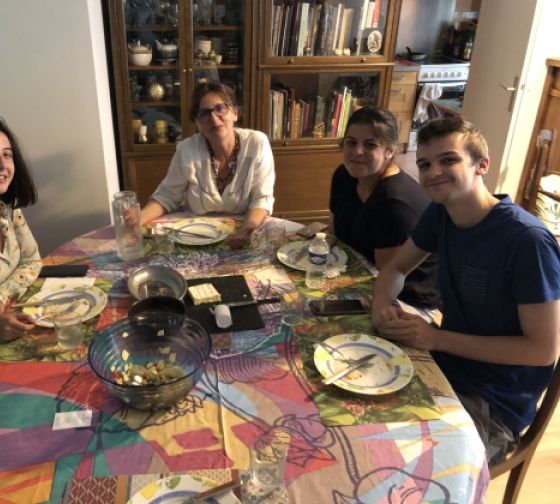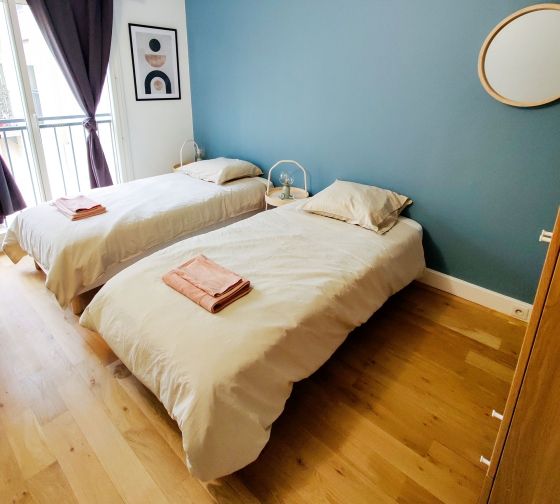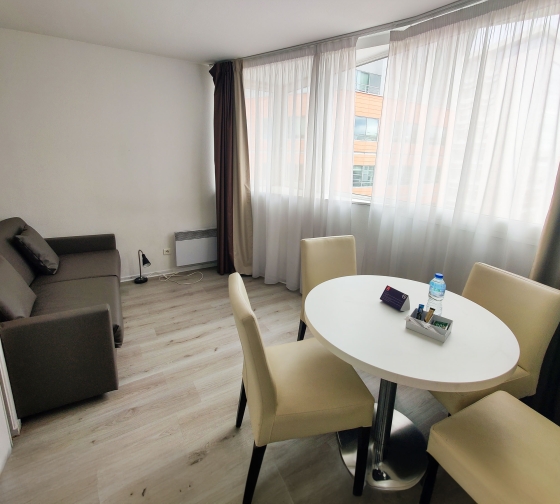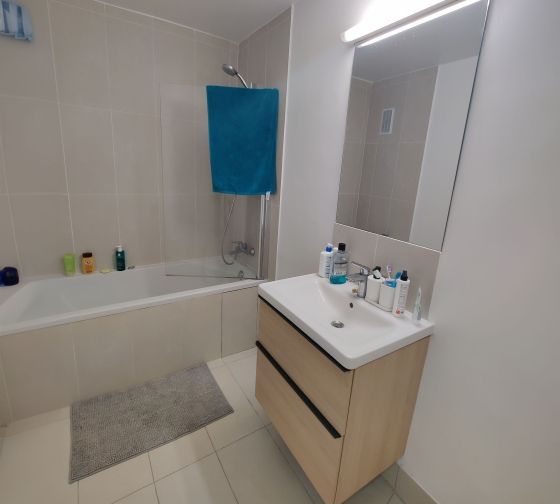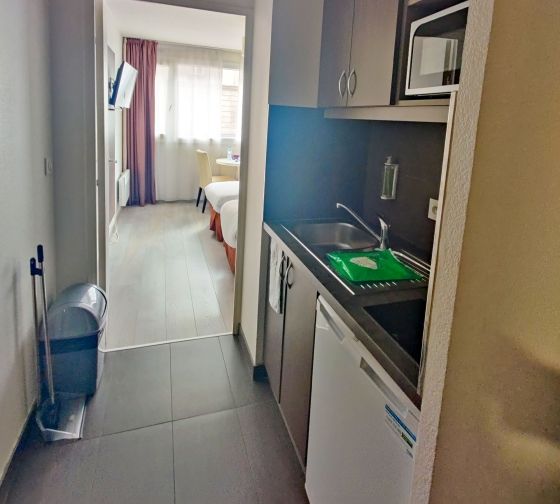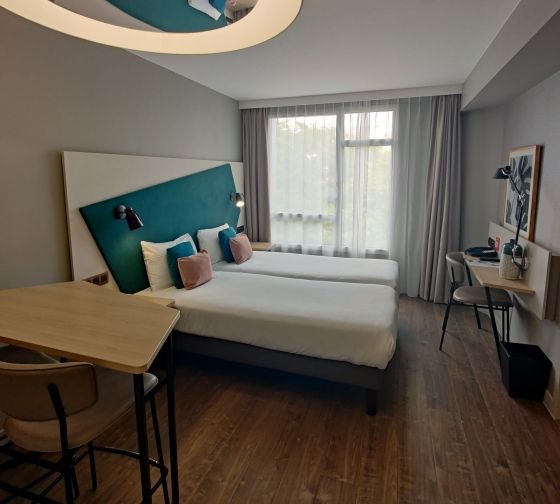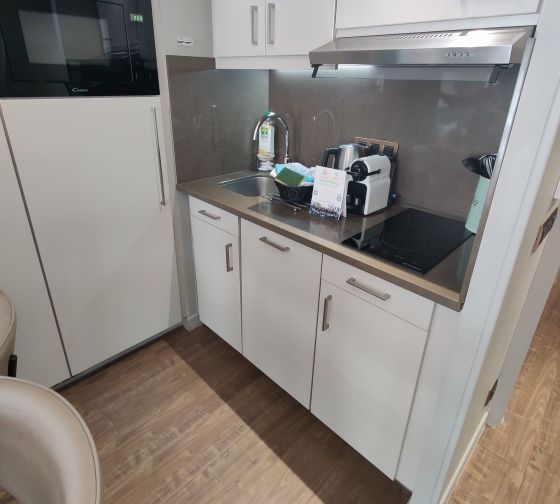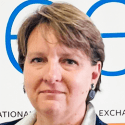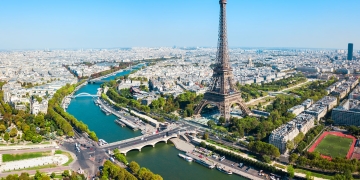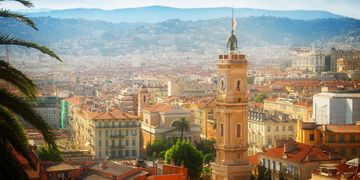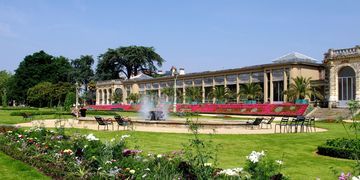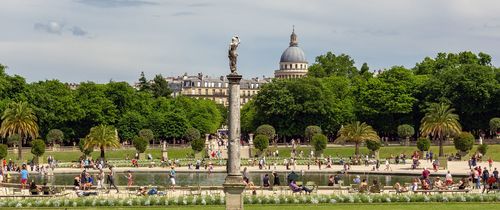
Semester in Paris
Unique Experiences
Learn about cheesemaking
or jam-making at one of our workshops
See the Mona Lisa
and the other 35,000 works of art at the Louvre Museum
Stroll along the Royal Palace Garden
and Rue Saint-Honoré and explore theaters, cafés, and luxury shops
The Destination
Paris is France's cosmopolitan city, offering an inspiring environment for students of all disciplines. The city's unique blend of French culture, iconic architectural landmarks like the Eiffel Tower and Notre-Dame Cathedral, bustling markets, and lively arts scene create an enriching backdrop for studying abroad. Whether you're studying business, science, engineering, technology, communications, psychology, health sciences, liberal arts, language, or fine arts, Paris is the perfect place to study abroad.
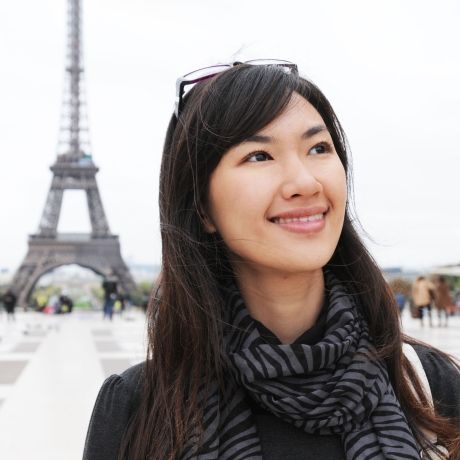
Program Highlights
- Academic Courses: Choose from CIEE courses, host institution courses, and online courses delivered by CIEE’s global partner, ASU, that align with your academic major.
- Optional Internship Placements: Enhance your program with an optional for-credit internship that aligns with your career aspirations.
- Immersive Experiences: Participate in activites, excursions, study tours, and more that showcase your host city's culture, values, and local art, film, music, cuisine, and sports scenes.
- Academic Projects: Enroll in an optional for-credit independent research project or service-learning project for increased professional development opportunities.
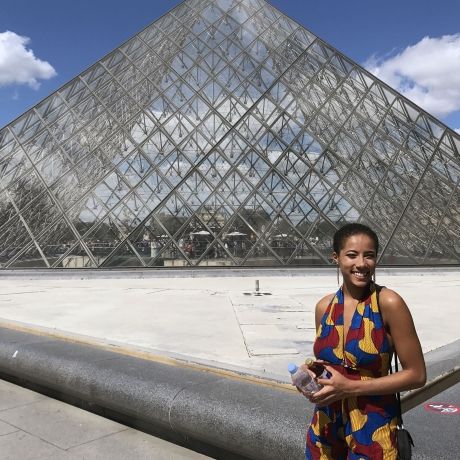
Excursions & Activities
CIEE’s excursions and cultural activities in Paris will open doors for you to explore France's rich diversity, language, culture, history, and timeless beauty in ways that will enhance your time abroad.
Samples of past excursions and activities:
- Participate in excursions to fascinating French locations, like Reims, Giverny, Chantilly, the Loire Valley, or Normandie
- Test your skills as a nose at the Fragonard Perfume Museum and learn about the history of perfume-making in southern France
- Take a stroll in the Montparnasse neighborhood to learn about the area’s influence on art and literature
Please note: Activities are based on past programs and subject to change at CIEE's discretion to adapt to local circumstances and participant feedback. Our goal when arranging activities is always to enhance your experience.
Program Blogs
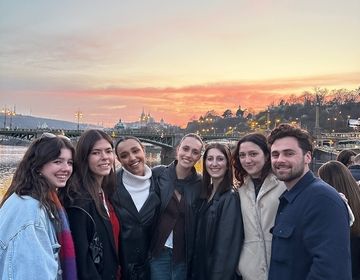
My Study Abroad Experience in Paris with CIEE
By: Julia Chapman I am reaching the end of my time in Paris and wanted to share some of my thoughts with anyone considering this program in the future! First... keep reading
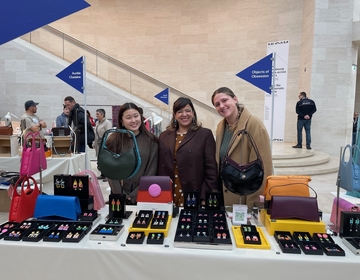
Why do an internship in Paris with CIEE?
Interning abroad is an enriching experience in many respects; in Paris, an internship will allow you to further immerse yourself in French culture while exploring your career interests. Here are... keep reading
Things to do in and around Paris’ 13th arrondissement
Discover the unique 13th arrondissement of Paris!
Housing & Meals
Housing
CIEE Paris offers diverse housing options to ensure you are comfortable in your home away from home. All housing options are located in neighborhoods around Paris or in close suburbs called ‘la petite couronne,’ with convenient access to public transportation. From apartments to residence halls, you will find your housing is conveniently situated near grocery stores, city supermarkets, cafés, eateries, pharmacies, and everything else you could possibly need.
Standard Housing: Includes a single room in a homestay or a twin room at a shared apartment/residence hall/hotel/aparthotel all located under 50 minutes from CIEE Paris by public transport.
- Homestays: Homestays feature a kitchen, living room, and bathroom shared with a host family. Please note: It is helpful, but not required, to have a basic knowledge of French for living with a homestay. French hosts are not required to be fluent in English.
- Shared Apartments: Shared apartments boast a kitchen, bathroom, and a washing machine. Shared apartments with twin rooms also boast a living room.
- Residence Hall/Hotel/Aparthotel: If you stay in a residence hall/hotel/studio in an aparthotel, you will be housed in twin rooms, which feature a bathroom, a kitchenette, and weekly cleaning. Laundry facilities are available at cost in the facility.
Select Housing: Includes a twin room in a shared apartment located under 30 minutes from CIEE Paris by public transport or a single room in a shared apartment located within 50 minutes from CIEE Paris by public transport. All students living in the apartment will share a bathroom and a kitchen. A washing machine is available within the apartment. Select housing requires an additional fee.
Select Plus Housing: Includes a single bedroom in a shared apartment located under 30 minutes from CIEE Paris by public transport. All students living in the apartment share a bathroom and a kitchen. A washing machine is available within the apartment. Select Plus housing requires an additional fee.
A note: The default criterion to assign housing is first-come, first-served; however, other factors may also be considered. If we cannot accommodate your first housing choice, we'll let you know before you arrive. Non-standard housing options require an additional fee that can be found in the program Dates and Fees.
Meals
- Residence hall/hotel/aparthotel and shared apartments: Meals are not included.
- Homestays: Host families provide breakfast daily, plus five additional meals per week.
Academics
CIEE Paris: Study in Paris' 12th arrondissement at the foot of subway line #1 near grocery stores, organic supermarkets, cafés, bakeries, and famous landmarks. CIEE Paris features a main classroom, a student lounge, a study space, and an academic advising office.
Institut Catholique de Paris (ICP): Founded in 1875, ICP allows its students to have a rich historical experience while enjoying the modernity of a 21st-century campus. ICP teaches more than 10,000 students, one third of which are international students.
Arizona State University (ASU): Brought to you by CIEE in partnership with ASU, enhance your international coursework with online classes that align with your degree requirements. ASU offers thousands of online courses in asynchronous 7.5-week sessions that fit within the CIEE academic calendar.
Course Information
For students who want to take classes in French: A minimum of four semesters of college-level French (or equivalent) are required. Students will need to complete a language placement test post-acceptance to confirm their level and determine if additional language courses are recommended.
Academic Projects
Engineering and Engineering Technologies
Social Sciences
Agriculture
Business, Economics, Management, and Marketing
Communication, Journalism, and Media
Health Professions and Related Programs
Languages and Cultural Studies
Spring Block III 2026
Literature, Linguistics, and Writing
Visual and Performing Arts
Biological and Physical Sciences
Computer and Information Sciences and Support Services
Natural Resources, Conservation, and the Environment
Academic Projects
Engineering and Engineering Technologies
Social Sciences
Agriculture
Business, Economics, Management, and Marketing
Communication, Journalism, and Media
Health Professions and Related Programs
Languages and Cultural Studies
Literature, Linguistics, and Writing
Visual and Performing Arts
Biological and Physical Sciences
Natural Resources, Conservation, and the Environment
Psychology
Academic Projects
Engineering and Engineering Technologies
Social Sciences
Agriculture
Business, Economics, Management, and Marketing
Communication, Journalism, and Media
Health Professions and Related Programs
Languages and Cultural Studies
Literature, Linguistics, and Writing
Visual and Performing Arts
Biological and Physical Sciences
Computer and Information Sciences and Support Services
Natural Resources, Conservation, and the Environment
Institut Catholique de Paris (ICP)
With six libraries, classrooms equipped with the latest technology, and a brand-new auditorium, students at ICP feel at home and ready to explore new possibilities.
Thanks to its prime location, our campus is very easily accessible by public transport and all major services are within walking distance.
Course offerings may vary from semester to semester. Courses are taught in English or French as listed are typically 1 to 2.5 U.S. credits each (2 to 5 ECTS credits). Here is a sample of ICP courses:
Fall courses (in English)
- British Art History
- British Civilization
- Business Ethics
- Cinema and History
- Civilization of the Commonwealth
- Contemporary International Issues
- Economics for Business Lawyers
- Film Analysis Art
- Institutional law of the EU
- Introduction to English and American Art History
- Literature and Arts (for Art History students)
- Political Globalization
- Postcolonial Literature
- Visual Arts: Image and Representations
Spring Courses (in English)
- Anticorruption Compliance
- Comparative Politics
- Conflict Analysis
- Design and Management of a Business Plan
- European Freedoms
- European Taxations
- Film Analysis Art
- International Institutions
- Introduction to International Tax and Transfer Pricing
- Media and Politics
- Political Science in the European Union
- Introduction to English and American Art History
Fall courses (in French)
- Ancient Greco-Roman Art – Greek Art
- Ancient Greco-Roman Art – The Art of the Hellenistic and Roman Orient
- Ancient History (Greek)
- Ancient History (Roman)
- Art of Islam or Byzantine Art
- Civilization Ancient Near East
- Civilization of the Ancient Near East
- Classical Philosophy I: Descartes
- Comparative Literature
- Consumer Sociology
- Contemporary Issues
- Contemporary Political Thought
- Corporate Finance
- Economics of Globalization
- Emotional and Sexual Life Education in Social Intervention
- Entrepreneurship and Project Management
- Environment, Planning: Introduction to Touristic Planning
- Epistemology
- Ethics of Organizations
- Evaluation
- Geopolitics of the Media
- Group Dynamics and Conflict Management
- Heritage of Christianity
- History and Management of Collections and Exhibitions
- History and Sociology of Political Parties
- History of Political Ideas
- History of the Ancient Near East
- History of the Medieval Orient
- History of the Museum
- History of the Roman Republic and Empire
- Innovation and Pedagogical Practices
- Institutional Law of the European Union
- Institutions and Political Life Under the Fifth Republic
- Intercultural Mediation
- International Business – Strategies for the Internationalization of Companies
- International Security
- Introduction to Communication
- Introduction to Islam
- Labor Law: Individual Relations
- Lifelong Learning
- Literature and Spirituality
- Literature of the Middle Ages and the Renaissance – Various Genres
- Major Regions of the World: The Norths
- Management: Economic and Accounting Analysis for Companies
- Media Analysis
- Media History
- Medieval History
- Medieval Philosophy II: Bonaventure and Thomas Aquinas
- Modern and Contemporary French Literature – 19th-Century Novel
- Modern French
- Modern History
- Monetary and Financial Economics
- Old French
- Philosophy
- Political History
- Political Ideas in Antiquity
- Private Judicial Law
- Public International Law
- Public Policies
- Religion and Secularism
- Religion and Society in France from the Modern Era to the Contemporary Period
- Right to Fundamental Freedoms
- Social and Solidarity Economy: Comparative International Approaches
- Social Law
- Social, Cultural and Academic Diversity in Pedagogy
- Sociology of Family
- Sociology of Integration and Exclusion
- Sociology of Religions
- Sociology of the World of Work
- Sociology of Violence
- The Intercultural in Education
- The World of the Bible
- Theories and Sociology of International Relations
- Urban Sociology
- Western Medieval Art – Gothic Art
- Western Medieval Art – Romanesque Art
- 17th-Century Literature - Theater
- 18th-Century French Literature – Various Genres
Spring courses (in French)
- Ancient History (Greek)
- Art from the 15th to the 18th Century – The 17th Century
- Art from the 15th to the 18th Century – The 18th Century
- Art from the 19th Century to the 21st Century – From the 1860s to the Avant-gardes
- Art from the 19th to the 21st Century – From the Avant-gardes to the Present Day
- Business Strategy
- Christian Anthropology
- Civilization of the Ancient Near East
- Commodity Market Analysis
- Comparative Literature (18th-20th Century)
- Comparative Political Regimes
- Contemporary History
- Contemporary History: Political Ideas (1914-2014)
- Contemporary Issues in Democracy
- Contemporary Political Regimes
- Development Economy
- Digital Humanities: Challenges and Elements of Understanding
- Eastern Spiritualities and Religions
- Economics and Management of the New Economy
- Energy and Food Policies
- Environment, Planning: City and Town Planning
- Family Law
- Foundation of Human Rights in Europe
- Francophone Literature
- French and Francophone Literature
- Fundamental Marketing
- Fundamental Morality
- History of Art History
- History of Contemporary Art (Artwork and Life of Artworks)
- History of International Relations: Thematic Approach
- History of Legal Thought
- History of Political Ideas
- History of the Ancient Near East
- History of the Modern World (17th-18th Centuries)
- Human Resources Management and New Managerial Practices
- Identifying and Understanding the Reasons for Dropping Out of School: Professional Positions in Education: Personalized Training and Actions-Research-Training Track
- Individual Trajectories: Continuities and Ruptures in Educational Paths and Life Stories
- Interculturalities
- Interculturality and Economic Activities
- International Legal Issues
- International Political Stakes
- International Relationships
- Intra-family Educational Processes
- Introduction to Comparative Education
- Introduction to Competition Law
- Introduction to Museum and Cultural Policies
- Introduction to Phoenician, Hebrew and Aramaic
- Introduction to Pragmatics
- Introduction to Private International Law
- Introduction to Sociology
- Knowledge Management
- Labor Law: Collective Relations
- Latin: Literature and Civilization of the Imperial Period
- Literature and Spirituality
- Literature of the Middle Ages and the Renaissance – Various Genres
- Major Regions of the World: France
- Media and Politics
- Medieval History
- Metaphysical
- Modern and Contemporary French Literature – 20th or 21st-Century Novel
- Modern French
- Modern History
- Moral and Political Philosophy
- New Objects of Sociology
- Otherness and Interculturality
- Penal Procedure
- Phenomenology
- Philosophical Hermeneutics
- Philosophy of Religion
- Political Sociology
- Public Finance Lecture
- Public Labor Law
- Public Policy Analysis
- Religions and International Relations
- Social and Political Morality
- Social Public Policies
- Sociology of Culture, the Media and Digital Media
- Sociology of the World of Work
- Special Administrative Law
- Substantive EU Law
- Sustainable Development and Local Ecological Transition
- Sustainable Development in the Age of the Anthropocene
- Sustainable Development, International Standards and Paradigm Shift
- Taxation
- The Phenomena of Digitization and Their Challenges
- Theater (Theory and Practice) or Introduction to Ancient Greek
- Thematic Geography: Economy and Territories in Globalization
- Thematic Geography: Geography and Politics
- Theories of Integration and Political Regime of the EU
- Theory of Organizations
- Web Theory and Practice
- Web Writing Workshop: Case Study and Remediation
CIEE proudly partners with ASU to deliver asynchronous, online coursework that aligns with your degree requirements from anywhere you study abroad.
CIEE and ASU offer courses online per program eligibility, at no additional charge. Be sure to review online courses with your home school advisor.
Check the CIEE Program Dates and ASU start dates below to maximize course options within your program!
Search ASU Online Courses BROWSE FAQs for more INFO
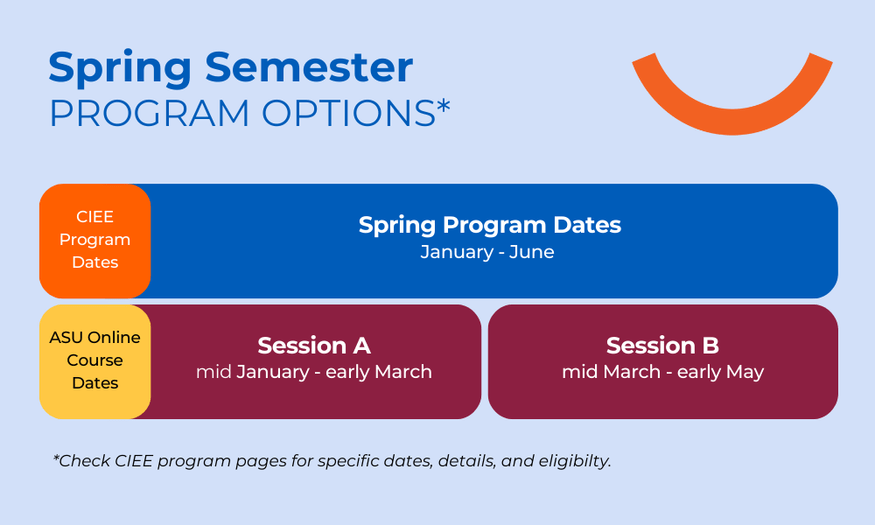
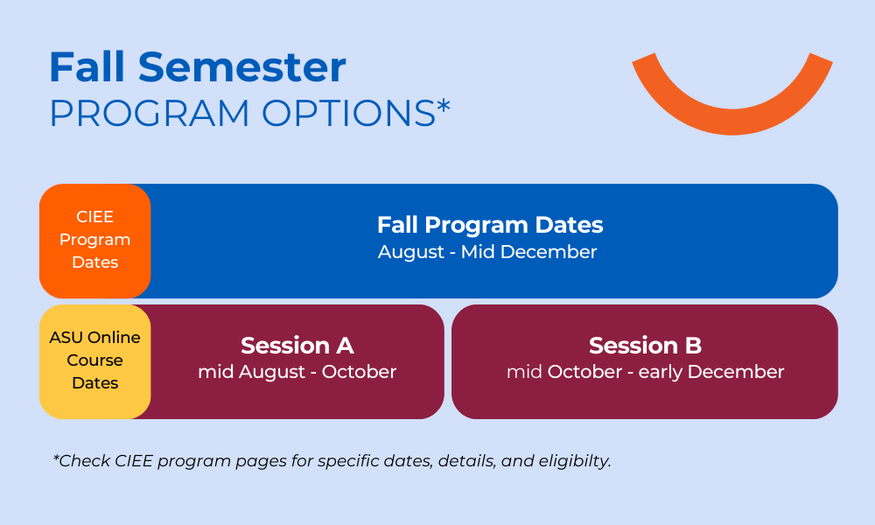
Note: This course listing is for informational purposes only and does not constitute a contract between CIEE and any applicant, student, institution, or other party. The courses, as described, may be subject to change as a result of ongoing curricular revisions, assignment of lecturers and teaching staff, and program development. Courses may be canceled due to insufficient enrollment.
"(GI)" denotes courses that originated at CIEE's Global Institutes and that are offered at multiple CIEE sites.
Discover Internship Opportunities
We're excited you're considering this program! Next, explore the types of internships you can choose from for an epic internship abroad with CIEE Study Abroad.
Explore Industry Options
The work scene in Paris is vibrant and diverse, focusing on fashion, marketing, tourism, data analysis, and computer science. The city fosters innovation and creativity, strongly emphasizing collaboration and networking. In Paris, tradition seamlessly blends with modernity, enhancing its dynamic atmosphere.
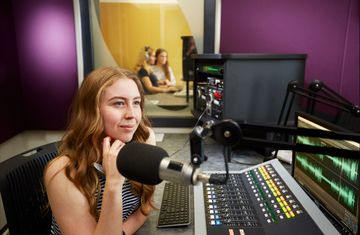
Arts, Audio/Video Technology and Communications
Immerse yourself in today's cutting-edge global media by working in film studios, media companies, the theater, and more.
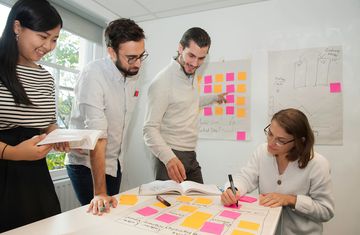
Business Management and Administration
Study international business practices, multicultural leadership, and global market dynamics in Scotland, China, and more.

Government and Public Administration
Gain insight into global policy-making, diplomatic relations, and governance practices in agencies, nonprofits, and firms.
Browse Internship Opportunities
Explore internship placements available through this program to find the right fit for your academic and professional goals.
Disclaimer: Internship placements are subject to availability and host employer hiring discretion. Application and payment of CIEE fees does not guarantee specific placement. This internship listing is for informational purposes only and does not constitute a contract between CIEE and any applicant, student, institution, or other party.
Scholarships & Grants
CIEE offers scholarships and grants annually to help students like you make your study abroad dream a reality.
Students who apply to this program are eligible for the following scholarships and grants:
- Ping Scholarships for Academic Excellence
- Global Access Initiative (GAIN) Grants
- CIEE Gilman Go Global Grant
To be considered, submit the CIEE Scholarships & Grants application within your CIEE program application.
Dates & Fees
You get more for every dollar when you study abroad with CIEE, because our high-quality programs include everything from excursions to insurance. There are no hidden charges, and no disappointing surprises when you arrive.
Program |
Application Due |
Start Date |
End Date |
Fees & Housing |
|---|---|---|---|---|
| Program Spring 2026 18 weeks | Application Due Deadline Passed | Start Date | End Date | Fees & Housing $21,950 |
| Program Fall 2026 18 weeks | Start Date | End Date | Fees & Housing $21,950 | |
| Program Academic year 2026-2027 | Start Date * | End Date TBD* | ||
| Program Spring 2027 18 weeks | Start Date * | End Date * |
*Dates for this program are provided as tentative dates. Please consult with your study abroad advisor to confirm dates before purchasing your flights.
To help you budget, keep in mind that students are responsible for the cost of international airfare, local transportation, books and supplies, visas, and personal expenses. In addition, your college or university may charge additional fees for study abroad, or may require you to receive a transcript via CIEE's School of Record, which carries an additional fee of $500.
Program Fees
CIEE offers the most student support of any provider in its program fee, including an airport greeting, full-time leadership and support, orientation, cultural activities, local excursions, pre-departure advising, and CIEE iNext travel protection with benefits.
| Participation Confirmation | $300 * |
| Educational Costs | $13,956 ** |
| Housing | $7,500 *** |
| Insurance | $194 |
| Total Fees | $21,950 |
Optional Housing
CIEE accommodation options are detailed in the Housing section. Based on availability, Select or Select Plus Housing can be chosen during the application process for an additional fee. Housing is assigned on a first-come, first-served basis; however, other factors may also be considered.
| Select Housing Fee | $1,800 |
| Select Plus Housing Fee | $2,700 |
Financial Aid
CIEE offers the most grants and scholarships of any study abroad organization, including $8 million/year in travel grants, merit-based scholarships, institutional grants, and Gilman Go Global Grants.
Estimated Costs
Students are responsible and manage costs related to travel, meals, books, and personal expenses. Below are estimates for consideration.
| Meals not included in program fee | $1,944 † |
| International Airfare | $1,250 †† |
| Local Transportation | $490 |
| Books & Supplies | $150 |
| Visa Fees | $645 ††† |
| Potential travel to consulate for visa | $500 †††† |
| Personal expenses | $325 ††††† |
| Total Costs | $5,304 |
*non-refundable fee
**direct cost of education charged uniformly to all students
***Housing fees listed are for financial aid purposes only and should not be considered a basis for calculation of refunds.
†For students in homestays, families provide breakfast and 5 meals a week. For students in residence halls/apartments, you should budget approx. $388 per month for groceries if you plan on making your own meals, and more if you plan on eating out regularly.
††round-trip based on U.S. East Coast departure
†††The minimum fees total $645, which includes Regular Campus France service, the standard service fee for your visa appointment, a visa processing fee, and a visa validation fee upon arrival in France. The maximum fees total $915, if you elect for expedited Campus France service and a prime time visa appointment. This estimate does not include any personal travel expenses you might incur to reach the consulate.
††††If no consulate in your home area
†††††$100 emergency fund + cell phone expense + toiletries
Program Fees
CIEE offers the most student support of any provider in its program fee, including an airport greeting, full-time leadership and support, orientation, cultural activities, local excursions, pre-departure advising, and CIEE iNext travel protection with benefits.
| Participation Confirmation | $300 * |
| Educational Costs | $13,956 ** |
| Housing | $7,500 *** |
| Insurance | $194 |
| Total Fees | $21,950 |
Financial Aid
CIEE offers the most grants and scholarships of any study abroad organization, including $8 million/year in travel grants, merit-based scholarships, institutional grants, and Gilman Go Global Grants.
Estimated Costs
Students are responsible and manage costs related to travel, meals, books, and personal expenses. Below are estimates for consideration.
| Meals not included in program fee | $1,944 † |
| International Airfare | $1,250 †† |
| Local Transportation | $500 |
| Books & Supplies | $150 |
| Visa Fees | $645 ††† |
| Potential travel to consulate for visa | $500 †††† |
| Personal expenses | $325 ††††† |
| Total Costs | $5,314 |
*non-refundable fee
**Direct cost of education charged uniformly to all students
***Housing fees listed are for financial aid purposes only and should not be considered a basis for calculation of refunds.
†For students in homestays, families provide breakfast and 5 meals a week. For students in residence halls/apartments, you should budget approx. $388 per month for groceries if you plan on making your own meals, and more if you plan on eating out regularly.
††round-trip based on U.S. East Coast departure
†††The minimum fees total $645, which includes Regular Campus France service, the standard service fee for your visa appointment, a visa processing fee, and a visa validation fee upon arrival in France. The maximum fees total $915, if you elect for expedited Campus France service and a prime time visa appointment. This estimate does not include any personal travel expenses you might incur to reach the consulate.
††††If no consulate in your home area
†††††$100 emergency fund + cell phone expense + toiletries
Program Fees
CIEE offers the most student support of any provider in its program fee, including an airport greeting, full-time leadership and support, orientation, cultural activities, local excursions, pre-departure advising, and CIEE iNext travel protection with benefits.
Financial Aid
CIEE offers the most grants and scholarships of any study abroad organization, including $8 million/year in travel grants, merit-based scholarships, institutional grants, and Gilman Go Global Grants.
Estimated Costs
Students are responsible and manage costs related to travel, meals, books, and personal expenses. Below are estimates for consideration.
Program Fees
CIEE offers the most student support of any provider in its program fee, including an airport greeting, full-time leadership and support, orientation, cultural activities, local excursions, pre-departure advising, and CIEE iNext travel protection with benefits.
Financial Aid
CIEE offers the most grants and scholarships of any study abroad organization, including $8 million/year in travel grants, merit-based scholarships, institutional grants, and Gilman Go Global Grants.
Estimated Costs
Students are responsible and manage costs related to travel, meals, books, and personal expenses. Below are estimates for consideration.
What's Included
Tuition
Housing
Pre-departure Advising
Advising before you depart to set goals and answer questions
Optional on-site airport meet-and-greet
Orientation
Introduction to your program plus practical information about living in your host city
On-site Staff
Full-time program leadership and support in your city
Cultural and/or Co-curricular Activities
Excursions and/or Study Tours
Travel Protection
CIEE iNext travel protection
24/7 emergency on-site support
Some Meals
For students living in homestays
Our Staff
Delphine Mauny
Center Director
A born-and-bred Parisian, Delphine has extensive experience in international education, having worked with American high school students, college students, and adults traveling to France.
Franck Le Gac
Academic Director
Franck oversees the coordination, quality, and planning of all courses and educational programing in Paris. He is responsible for faculty staffing, finalization of syllabi, the course evaluation process, and program...
James Benn
Student Life Director
James studied abroad in high school and college. He designs the student life experience in Paris, fostering an enriching personal and cultural connection, one student at a time.
Get Started
1
2
Connect With Your Campus Study Abroad Office
Share your plans and confirm you're on track to meet all required steps to go abroad.
3
Contact CIEE
We're here to help! Send us an email if you still have questions or need information about applying to this program.
4
Interested in an optional internship?
After being accepted to this program and submitting the required internship documents, work with CIEE staff on your internship goals and select which positions to interview for. CIEE will reach out to companies that would be a good fit for you, your interests, and your qualifications. Finalize your internship placement upon arrival!
